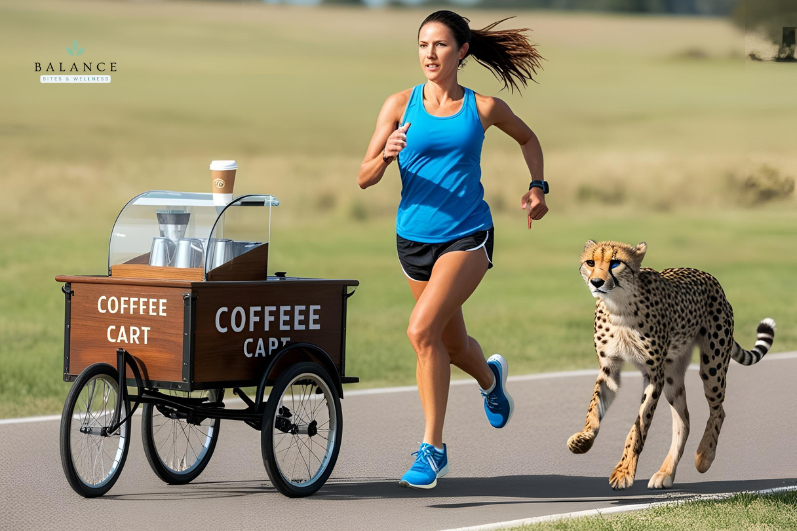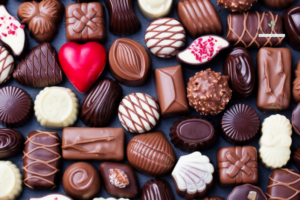Imagine this: you’re lacing up your sneakers, a cheetah is eyeing you from across the savanna, and you’ve got a steaming cup of coffee in hand. Could chugging enough espresso give you the speed to outrun the fastest animal on Earth, clocking in at 120 km/h (75 mph)? At BBWellness, we’re diving into this wild question to explore caffeine, energy, and what really powers your body. Spoiler alert: you might need more than a coffee cart to keep up!
Contents
The Caffeine vs. Cheetah Speed Challenge
Let’s break it down with some fun math. A cheetah sprints at 120 km/h, covering about 33 meters per second. To match that speed, a human would need an insane burst of energy. Caffeine, the magic ingredient in your morning brew, stimulates your nervous system, boosts alertness, and can enhance physical performance—but only to a point.
An average cup of coffee (8 oz) contains about 95 mg of caffeine. Studies suggest caffeine can improve sprint performance by roughly 1-2% for short bursts. Let’s say you’re a fit human running at 20 km/h (pretty fast for us mortals). To hit cheetah speed, you’d need a 600% performance boost. Crunching the numbers, that’s roughly 5,700 mg of caffeine—or 60 cups of coffee in one go!
Picture yourself sprinting with a coffee cart rattling behind you, cups stacked to the sky. You’d be jittery, sure, but nowhere near cheetah-level speed. Why? Because caffeine isn’t a superpower—it’s a temporary kick.

Why Caffeine Can’t Make You a Superhero
Drinking 60 cups of coffee sounds like a wild plan, but here’s the reality check: caffeine overload is no joke. Consuming that much would likely lead to heart palpitations, anxiety, and serious health risks—not a victory lap. Even at normal doses, caffeine gives you a quick energy spike by blocking adenosine (the “sleepy” chemical in your brain) and ramping up adrenaline. But that boost fades fast, leaving you crashing if you over-rely on it.
Here’s what else happens when you lean too hard on coffee:
- Sleep disruption: Caffeine can mess with your circadian rhythm, making it harder to get quality rest.
- Energy dips: Those highs come with lows, leading to fatigue if you’re sipping all day.
- Nutrient imbalance: Coffee’s great, but it’s not a meal. Overdoing it might mean skipping balanced nutrition.
The takeaway? Caffeine can be a helpful tool for a pre-workout jolt, but it’s not a substitute for real energy sources. To run your best race—cheetah or no cheetah—your body needs more than a quick fix.
Powering Up the Healthy Way
So, if coffee won’t make you outrun a cheetah, what will keep you energized? At BBWellness, we’re all about sustainable health habits that fuel your body for the long haul. Here’s how to build true energy without a coffee cart in tow:
Eat for Energy
Fill your plate with whole foods like fruits, vegetables, lean proteins, and complex carbs. Think of oatmeal as your steady fuel tank, unlike coffee’s short-lived spark. These foods provide vitamins and minerals that support muscle function and stamina.
Prioritize Rest
No amount of caffeine can replace sleep. Aim for 7-9 hours nightly to let your body repair and recharge. A well-rested you is faster than a caffeinated zombie any day.
Move Smart
Regular exercise—like jogging, yoga, or strength training—builds endurance naturally. You don’t need to chase cheetahs; a consistent routine makes you feel unstoppable.
The Final Sprint
Let’s be real: no human’s outrunning a cheetah, coffee or not. But chasing that idea taught us something big: quick fixes like caffeine can’t match the power of balanced health. Next time you’re tempted to chug an extra latte for a boost, try a banana and a nap instead. Your body will thank you—and you might just feel fast enough to take on the savanna.
Curious about caffeine’s effects? Check out these resources:
What’s your go-to way to stay energized? Drop a comment below—we’d love to hear! And stick with BBWellness for more quirky health tips that make you think twice.




